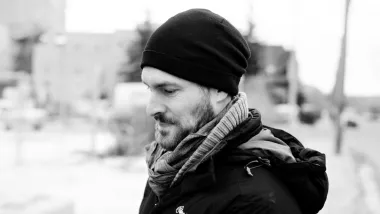By taking a turtle for a walk, we can begin to take back our minds and bodies.

Maybe I’m motivated by the recent spike in hating others vis-à-vis the post-Trump-winning-fallout; thus I’ve been reimagining articles on spatial justice I wrote for the now disappeared Fast Forward Magazine (RIP). Given the fallout, perhaps the motivation will continue. Now, let's start with walking.
Thomas De Quincey could be considered the first flâneur, which might be defined as, "to walk idly," or more obliquely, to be “a connoisseur of the street." He was a prolific opium eater during the 19th century and spent much time aimlessly adrift in the city of London. Walking was his attempt to negate the perceived perfection of modernity: our need for speed, for efficiency, for a world of rational order. During this period, some flâneurs found it fashionable to take a pet turtle for a walk, a pace that was a "time war" against efficiency, against our obsession with time management and productivity. As the industrial class was beginning to dominate society, to flâner was a protest of such business. Slowing down, meandering, wandering, drifting — the intent was to take delight in movement itself, to inhale city smells and let in the sounds of an unhurried tour of streets. Walking wasn't a means of travel to get somewhere. To flâner—the act of the flâneur—was reward enough. To "wed the crowd," as French poet Baudelaire described it, meant to be a part of the group without necessarily holding the same prescriptions.
There is an adage that says those who control the streets control the state. I'm reminded of citizens with placards reading, "Not my president" and "Lock her up." But perhaps it's: What controls our minds controls the state. To flâner was democracy in action. Walking isn’t simply a way about the city, but rather a commentary on the city itself, an explicit critique on the spatial outcome of speed, efficiency, rational order. But deeper than that, it becomes a way to resist what controls our minds.
Sociologist Antonio Gramsci uses an "organic relationship" to explain the ability of having an emotional attachment to a place, an area you identify with that helps you feel like, well, you (in all that wonderful messiness). But a city constructed for The Modern Order disrupts this sensual experience. Modernity and its prescriptions atomize us, into destinations, into cars, into consumers, into whatever we want to define as not the sensual experience. We close off our minds from the sensual, from wedding the crowd. The cold, rational use of urban space is a product of a certain economic ideology tied to efficiency and speed (the profit motive). In the arena of place, by taking a turtle for a walk, you disassemble the logic of the profit motive city—its imposition on your body and mind.
The customs of the flâneur can become translated into the concept of having a "right to the city," or perhaps the somewhat more abstract concept of spatial justice. Simplistically, awareness of the pressures against inefficiencies and the drive for the profit motive can start a conversation about how to redistribute or reuse space, taking it away from what dominates or bodies and brains. One physical symbol of dominance is the automobile. What was supposed to be the ultimate form of individualism and efficiency—of modernity—has led to the urban sprawl of big-box stores and drive-through fast food "restaurants," to dispersed communities that only further isolate us. The automobile-based life can be seen as a form of space bestowed by the profit motive, and thus inducing spatial injustice.
There are ways to improve our rights. Pop-up parks that take over a parking stall, a block party that shuts down a street, a flash-mob snowball fight—these acts further implement the ideas laid down by the flâneur. They disrupt efficiency—and they're fun! They can be a political act of engaging with our cities, of figuratively redistributing space (if albeit temporarily). But they can also have longer term implications on our consciousness, of how places should feel. By regaining space, we begin to regain our minds. We can slowly begin to erode oppressive forces in every-day-life, the sometimes subtle ones of being condemned to the car-commute, and the ones that sometimes scream hate at us on a bus ride home from work.
[The above is based on the article "Taking a turtle for a walk, reshaping cities by seeking spatial justice." Fast Forward Weekly, 2015.]

Planetizen Federal Action Tracker
A weekly monitor of how Trump’s orders and actions are impacting planners and planning in America.

Chicago’s Ghost Rails
Just beneath the surface of the modern city lie the remnants of its expansive early 20th-century streetcar system.

Amtrak Cutting Jobs, Funding to High-Speed Rail
The agency plans to cut 10 percent of its workforce and has confirmed it will not fund new high-speed rail projects.

Ohio Forces Data Centers to Prepay for Power
Utilities are calling on states to hold data center operators responsible for new energy demands to prevent leaving consumers on the hook for their bills.

MARTA CEO Steps Down Amid Citizenship Concerns
MARTA’s board announced Thursday that its chief, who is from Canada, is resigning due to questions about his immigration status.

Silicon Valley ‘Bike Superhighway’ Awarded $14M State Grant
A Caltrans grant brings the 10-mile Central Bikeway project connecting Santa Clara and East San Jose closer to fruition.
Urban Design for Planners 1: Software Tools
This six-course series explores essential urban design concepts using open source software and equips planners with the tools they need to participate fully in the urban design process.
Planning for Universal Design
Learn the tools for implementing Universal Design in planning regulations.
Caltrans
City of Fort Worth
Mpact (founded as Rail~Volution)
City of Camden Redevelopment Agency
City of Astoria
City of Portland
City of Laramie






























